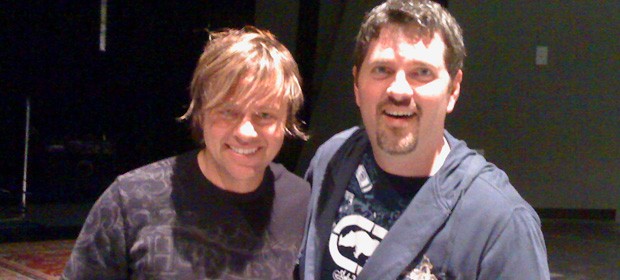Last Friday night famed vocal coach Brett Manning (he coaches people like Taylor Swift and Keith Urban) came to Brookwood Church to do a seminar. He doesn’t do many but he’s an old friend of worship leader Steve Smith. You might have seen him on CMT’s “Can You Duet” show – it was kind of like a Country American Idol. Brett was a judge along with Naomi Judd and songwriter Aimee Mayo.
At the end of the seminar we had a question and answer time. I asked “Church music has changed so much in the past 20 years, could you talk about the difference between “legit,” traditional/operatic singing and contemporary vocal style?”
Brett said the main difference is… personality! Think of how much personality is injected into contemporary vocals… compare how distinctly different Randy Travis, Madonna, Scott Stapp and Billie Joe Armstrong of Greenday sound. He hilariously mimicked Celine Dion perfectly, demonstrating all the vocal tones and effects she can produce.
Contrast this with “legit” singing. The vocals are vowel to vowel, all produced in the same, even sounding way and all notes are held for their full duration.
This reminds me of something American Idol top ten finalist Chris Sligh recently told me. He was doing a concert at a church, and the music director said something like “my vocalists are good but something doesn’t seem quite right.” At the praise team rehearsal Chris heard the problem: the vocalists were singing “properly” and holding out notes for their full duration. Kind of sounds like the problem I talked about a few weeks ago at WorshipIdeas – the pressing problem in worship music today is not transitioning to contemporary from traditional, it’s in learning to do contemporary music in a contemporary way.
Depending on the song, a contemporary vocalist won’t hold out a full quarter note, even if it’s written as a quarter. Chris mimicked the vocalists he heard singing the popular praise song “Mighty to Save.” Instead of singing the song conversationally and casually as it was originally recorded, the vocalists were singing “mighty to saaaaaaaaaave” and stretching out that note with full vibrato.
How can you help your vocalists? It’s no different than trying to get a stubborn, dated guitarist to use a capo, only in this case you’re trying to convince a vocalist that they can lay off the vibrato. As I said in my article, it’s a pride issue. If your team has teachable, humble heart attitudes you just might have a chance.
Check out Brett Manning’s Singing Success vocal training course. I’ve used it myself and really enjoyed it





